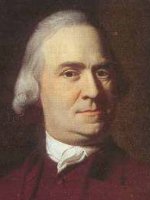Samuel Adams: beyond the caricature
 It's well worth reading Jeremy A. Stern's reply to a publicity editorial (i.e., he's got a book out, and now finds something to say in an op-ed piece) by Fox news reader Eric Burns on History News Network. Burns or a research assistant had written:
It's well worth reading Jeremy A. Stern's reply to a publicity editorial (i.e., he's got a book out, and now finds something to say in an op-ed piece) by Fox news reader Eric Burns on History News Network. Burns or a research assistant had written:Samuel Adams of the Boston Gazette,...takes a back seat to everyone, including Jayson Blair, in terms of ethics. So desperate was Adams for the colonies to become independent from the Crown---either legislatively or militarily, whatever it took---that he wrote stories about British soldiers in Boston molesting women in the streets. It never happened. He wrote stories about British soldiers in Boston assaulting men on the streets. It never happened. He wrote stories that urged violence against British officials charged with collecting taxes, then summoned his henchmen to the Gazette's offices after closing hours and plotted the violence for them. Hang taxman Andrew Oliver in effigy, he told them. Trash his office. Destroy his home. Threaten him with physical harm if he did not resign. His minions did precisely as told.
As Stern points out, Adams was not the proprietor of the Boston Gazette, did not summon minions to an office there, and did not by any documented account issue orders for violence. He did express regret and disapproval about violent demonstrations while arguing that they were a foreseeable consequence of Crown policies. Adams almost certainly did not write the news stories about British soldiers in Boston that Burns refers to. And as for how Burns feels sure those events "never happened," it's unclear. Especially to me, since I spent Friday afternoon reading reports from Boston town watchmen about their confrontations with British military officers, much like those described in the newspapers of the time.
Then, a few days later, Sam Adams wrote an article describing such reprehensible actions without either regret or acknowledgment that he had been their primary cause.
Burns comes from a long line of conservative writers caricaturing Samuel Adams as a troublemaker, apparently because they fear the idea of revolutionary change. Likewise, Harlow G. Unger's biography of John Hancock uses Adams as a foil to present Hancock as a sober, business-minded moderate. (As a businessman Hancock converted a large fortune into a small one, and he played to crowds more than Adams did.) William H. Hallahan's The Day the American Revolution Began, among many shameful errors of facts, goes so far as to say that Adams broke into the governor's house to obtain embarrassing letters. (Those letters were leaked to the American Whigs by sympathetic London officials.)
I wonder whom today's conservatives would prefer to imagine as principal organizer of the early Revolutionary movement. Perhaps an upper-class man who earned a master's degree, tried business, and then sought public office. Who lived relatively simply on his salary and refused bribes. Who was devout, espoused traditional religious values, recruited young activists through church organizations, and yet learned to work with people of some different faiths. Who didn't seek audience adulation or lead street protests, but worked hard in committees, wrote newspaper essays, moderated public meetings, and drafted legislation. Who spoke against disorder and what he saw as public immorality. Who worried about the national government becoming too strong but came around to support the U.S. Constitution because small manufacturers urged its ratification. Who retired from long service in public office without a fortune to sustain him in his last years.
In other words, today's conservatives might prefer Samuel Adams. The real Samuel Adams.
ADDENDUM: More on the distorted portrait of Samuel Adams we've inherited here and here.

4 comments:
Can you explain how Boston Brewing Company gets to use the Sam Adams name?
As with the John Hancock Insurance Company (founded in the 1860s), there's no direct link between the patriot himself and the company that honors him while also benefiting from his name recognition.
Because Samuel Adams lived so long ago, before our current cultural and legal kowtow to brand names, his name's in the public domain. Anyone can start a business called "Sam Adams something-besides-beer." The Boston Beer Company now owns the "Sam Adams" trademark in that field because it got there first, in 1985.
One exception to that historical pattern of naming businesses after long-dead patriots is the Revere company/brand that makes copper-bottomed cooking pots and (at one time) 3-D cameras. That firm's an actual descendant of Paul Revere's copper-rolling company. But Revere was a more successful businessman than either Hancock or Adams.
As for whether it's historically accurate for Boston Beer Co. to label Samuel Adams as "Brewer • Patriot," I plan to address that in a future post.
Thank you for this post! I learned quite a bit. Is there a biography of Samuel Adams that you'd recommend reading? Thanks in advance!
I recommend the late Pauline Maier's chapter on Samuel Adams in The Old Revolutionaries and Ira Stoll's more recent biography, Samuel Adams: A Life.
Post a Comment